#dionysos deity
Explore tagged Tumblr posts
Text

I loved every part of this! the questions...the answers...the results...stunning! here's what I got!
i made a uquiz - of the many faces of dionysus, which is turned toward you?
#dionysus deity#dionysos deity#dionysus devotee#dionysus worship#dionysus#hellenic devotion#hellenic deities#hellenic pagan#hellenic paganism
1K notes
·
View notes
Text
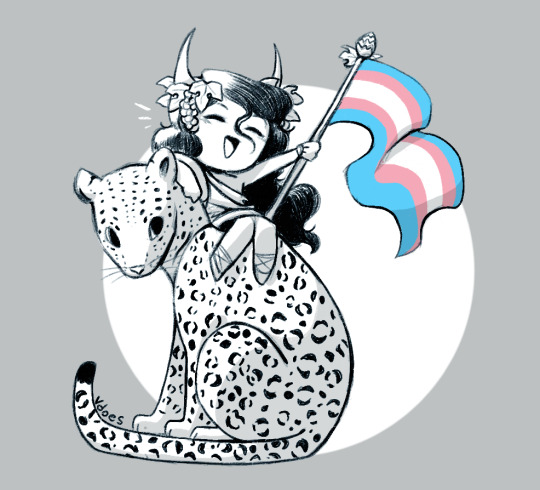
commission for @dionysiandevotion!
#dionysus says trans rights#v does art#sketch#commission#greek mythology#dionysus#dionysos#dionysus deity#dionysos deity#lgbtq#chibi#chibi commission
653 notes
·
View notes
Text









ORPHIC HYMN #53
TO LORD DIONYSOS
I call upon Bacchos, the god we worship annually,
chthonic Dionysos,
together with the fair-tressed Nymphs
he is roused.
In the sacred halls of Persephone
he slumbers and puts to sleep
pure
Bacchic time, every third year.
When he himself stirs up
the triennial revel again,
he sings a hymn
together with his fair-girdled nurses.
As the seasons revolve,
he puts to sleep and wakes up the years.
O blessed and fruit-giving Bacchos,
O horned spirit of the unripe fruit,
come to this most sacred rite
with a glow of joy on your face,
come teeming with fruit
that is holy and perfect.
(edited with the Apostolos Athanassakis trans.)
#lord dionysus#dionysus#dionysos#bacchus#bacchic#dionysian#dionysus deity#dionysos deity#dionysus worship#bacchanalia#lenaia#the bacchae#bacchae#bacchantes#bacchante#wine#persephone#chthonic#chthonic gods#hellenic polytheism#hellenic#hellenistic#hellenism#greek mythology#greek myth#orphic hymns#orphic hymn 53
269 notes
·
View notes
Text
Advice for beginner Hellenists
This isn't necessarily a post where I include a list of Gods, epithets, resources, and offerings for said Gods, but rather, hopefully soothing the worries of those of us who are starting the journey into the religion. As someone who was once in a religion that made other religions sound like something absolutely terrifying, my journey into Hellenism was once which was also... pretty terrifying, and this fear was mostly just from my own mind.
Anyways, my list of Advice:
You can literally just start praying. If you want to get more formal, you can absolutely get more formal, but you very much don't have to. I've definitely had my first prayers to some Gods be "hello, [God or Goddess's name], I want to worship You! Please lead me in my journey. Thanks!" I can promise you, the Gods are much kinder and more understanding than any of us fully know.
You can also just start worshiping in general. I feel like I've seen on occasion people worried about the Gods not "calling" to them. This is definitely not something that needs to happen pre-worship. If you find them interesting enough to pray to, then that in and of itself is enough.
In a similar vein, I wouldn't be too concerned about the idea of "signs". I feel like there's a tendency for folks to be incredibly worried about everything when first starting out - the behavior of a candle, the sighting of an animal, a strange dream, all can suddenly seem to take on jarring significance. But I can promise you, the Gods don't constantly give out signs, and frequently, these strange occurrences can be attributed to the mundane. When something comes from the Gods, you will know, trust me!
You don't have to worry too much about the idea of cleanliness, be it spiritual or physical. Khernips are cool, and I'd definitely recommend integrating them into your practice sooner or later. Hygiene is cool too! But if I'm being honest, we in the modern day are far more physically clean, and a lot less likely to regularly encounter the type of pollution that would have been encountered in ancient Greece.
The Gods will be at varying distances over the course of your worship. Sometimes, They will feel close, joyfully, burningly so. And sometimes, They will feel far, and prayers may even feel a bit futile. Both of those are perfectly okay, and neither of those will be permanent.
And, once again in a similar vein, you will likely not find yourself having constant, close mystical experiences with the Gods (i.e., conversations, visions, etc.). These experiences are rare and far between, and I would advise that you not make them a central part of your worship. They will come when the Gods deem you're ready for them, and you definitely won't be expecting it. Focus on the little things!
My final thing (for now) is that you also shouldn't put undue pressure on yourself to be doing some sort of big offering to the Gods. If that's what you can afford, that's great! But if not, fresh water, a small wildflower that you came across and picked*, or a small bit of a meal also count as a good offering!
And with that, my (much longer than I was previously planning on) list of things for beginners to keep in mind! A lot of this list is made up of things which I picked up along the way, and a lot of it is also made from my own personal hindsight being 20/20. I hope this is helpful to someone, and that it maybe soothes some of the (incredibly common) worries which so often accompany those who are venturing into the world of Hellenic polytheism!
#dionysian#dionysos#dionysus#hellenic polytheism#hellenic polytheist#dionysos deity#dionysus deity#hellenic pagan#hellenic gods#hellenism#helpol#beginner helpol
1K notes
·
View notes
Text
every time this comes up on my dash it cracks me up because this perfectly explains how I started worshipping Lord Dionysus 😂
one minute I'm talking to a friend about my religion and the next I'm sniffing my way round Aldi like a drug dog trying to find where the smell of cinnamon is coming from and finding a pinecone shaped candle

#dionysus deity#dionysos deity#dionysian#memes#hellenic polytheist#hellenic paganism#hellenic community#hellenic polytheism#hellenic deities#hellenic devotion#hellenic pagan#dionysus devotee#dionysus worship#dionysus
83 notes
·
View notes
Text
"I say the god [Dionysus] does not discriminate young dancers from old, that he craves honor from one and all alike, that no one - no one - is excluded from his worship."
- Euripides, "The Bacchae", translated by Herbert Golder
2K notes
·
View notes
Text
Lord Dionysos
God of grapes, wine, intoxication, ecstasy, insanity, inhibition, theatre, festivity, queerness, the wilds, madness, and pleasure.

Epithets
Maenoles ~ The Mad and Raging
Hestios ~ Of the Feast
Androgynos ~ The Androgynous
Phallen ~ The Phallic
Theoinos ~ God of Wine
Oinops ~ The Wine-Dark
Agathos Daimon ~ The Good Spirit
Kittophoros ~ The Ivy-Bearing
Staphylites ~ Of the Grape
Dimetor ~ The Twice-Born
Eleuthereus ~ Of Liberation
Soterius ~ Savior from Madness
Agyieus ~ Of the Streets
Mystes ~ Of the Mysteries
Khthonios ~ The Cthonic; Of the Earth
Melpomenos ~ Of the Tragedies; Of the Tragic Plays
Bassareus ~ The Fox-Like

Associations
Animals
Bulls
Leopards, panthers, tigers, and lions
Goats
Serpents
Foxes
Donkeys
Plants
Ivy
Grapes
Bindweed
Cinnamon
Silver fir trees
Cedar / Pine trees
Colors
Purple
Red
Black
Silver
Gold
White

Offerings and Devotional Acts
Wine and other alcohols
Cigarettes and other tobacco products
Other intoxicating substances
Candles and incense
Foods and drinks
Dried flowers
Bones
Coins
Symbols of queerness (pride flags, empty HRT vials, pride related colors, etc.)
Jewelry
Crystals and stones
Ivy and other vined plants
Fresh or dried fruits
Plants
Going to theatre performances
Going to bars and clubs
Getting intoxicated
Performance art
Dancing
Practicing moderation
Visiting vineyards and orchards

(credit to @sister-lucifer for the Dionysos themed dividers!)
#hellenic polytheism#helpol#hellenic polythiest#hellenic worship#hellenic deities#hellenic pagan#lord dionysus#dionysos#dionysus deity#dionysos deity#bacchus#lord dionysos#dionysos worship
305 notes
·
View notes
Text
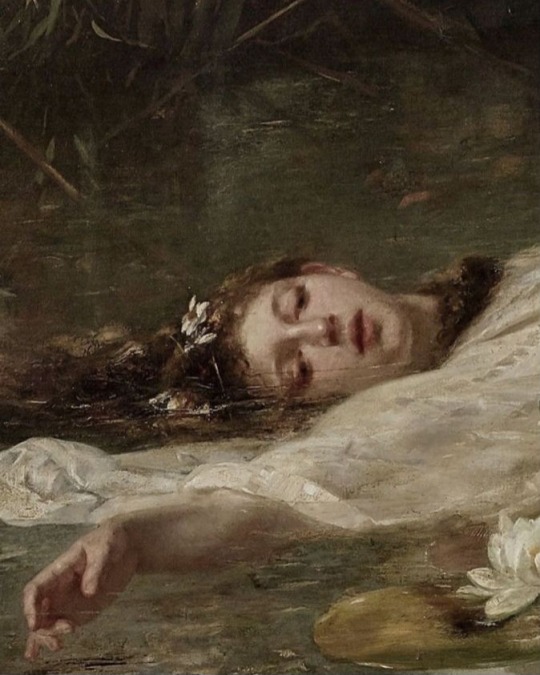
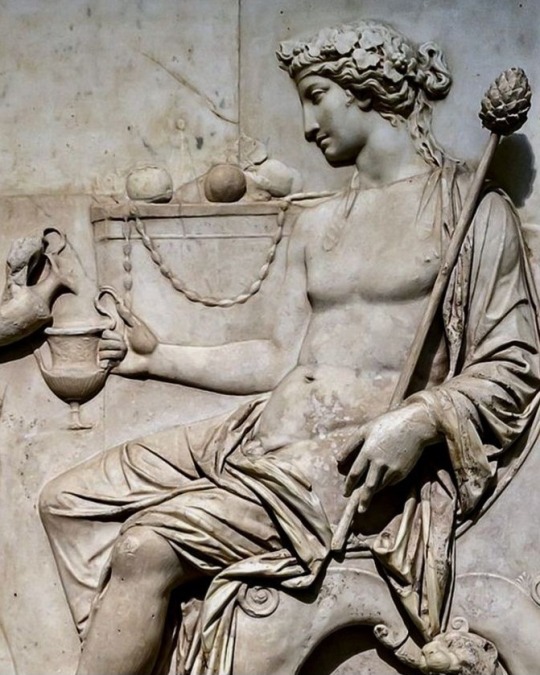
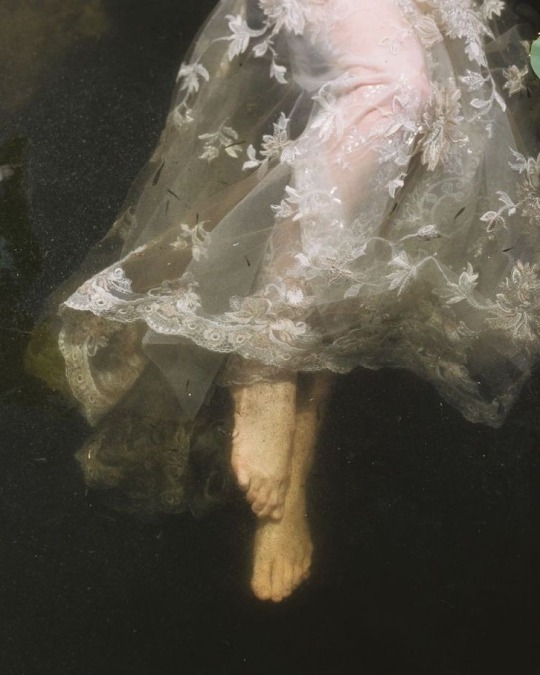
I humbly petition Dionysus, God of the Bacchae.
Liminal spirit of creation, Lord of hidden things.
Bless me with your divine inspiration and endow me with your essence.
This I pray. Khaire.

#🏛🕯#devotional post#pagan prayer#dionysus#dionysus worship#dionysus deity#pagan#paganism#hellenic pagan#hellenic paganism#helpol#polytheism#polytheist#dionysos#dionysos deity#dionysos worship#dionysian
351 notes
·
View notes
Text
O Dionysos, O Bacchus!
My Lord, may I be free from all stress and worry
O Eleutheros, O Liber!
May I rise up like the mighty grapevine
And may I create a path for myself wherever I see a dead end
Hail, O Bull-Horned God!
Hail, O Thrice-Born Lord!
#dionysus#dionysos#bacchus#dionysus worshipper#dionysus god#lord dionysus#lord dionysos#dionysos worshipper#dionysos god#dionysus deity#dionysus worship#dionysos deity#bakkhos#hellenic polytheist#hellenic polytheism#helpol#roman polytheism#religio romana#cultus deorum#paganism#pagan#hellenic paganism#hellenic pagan#theoi#polytheism#polytheist#roman paganism#Διόνυσος
271 notes
·
View notes
Text

Special Digital Offering to Lord Dionysus
HAPPY ATHESTERIA! 🍇🍷
#hellenic pagan#hellenic polytheism#dionysos deity#lord dionysus#dionysus#dionysus worship#Happy athesteria#dionysos
85 notes
·
View notes
Text
Praise to Dionysos Auxitês!











Auxitês = Giver of increase
Dionysos Auxitês, giver of increase; I cannot begin to thank you for your guidance. From you I understand; Indulgence is not bad, Wanting more is not bad, That I am deserving. You have taught me my limits of giving, and that sometimes, I must only give to myself. That self-care can be self-indulgence, and That I do not need to deprive myself in order to give to others. It is from you, joyous one, that I am unafraid of my body; Unafraid of my needs, Unafraid of my wants, Unafraid of cravings or desires. Dionysos Auxitês, giver of excess; My guide whom is always by my side, I now understand. Whom although I may come and go, will always be there when I most need. I praise you; Oh holy indulgence! With your sweet eyes and your sunburnt skin. Giver of plenty. Oh holy indulgence! Dionysos Auxitês, I praise and thank you!
-> Dionysos divider by @/sister-lucifer
#songs to the theoi#dionysos auxitês#dionysos deity#dionysus deity#dionysos#lord dionysus#dionysus worship#dionysian#dionysus god#dionysus moodboard#e offering#helpol#hellenic polytheism#hellenic worship#hellenic deities#polytheist#e offerings#digital offering#prayer#personal prayer#dionysus prayer
82 notes
·
View notes
Text
have a photo dump of random pictures of Dionysus I just had on my phone









#dionysus deity#dionysos deity#dionysus#dionysos#dionysian#dionysus worship#dionysos worship#ancient art
535 notes
·
View notes
Text
In honor of Pride, I'm going to list a few Hellenic deities to think of more actively during this time
Aphrodite: Historically known to be intersex and trans, especially under the name Aphroditos. Not to mention as a goddess of love, that means all kinds of love and expressions of it. Everyone in the LGBT+ umbrella can turn to her without worry.
Apollon: He is known for epithets like the Unshorn, and for literally wearing feminine clothing for the time.
Artemis: Known for embracing masculinity and more masculine traits like her interests, mannerisms, and appearance (attire). Also known to be aro/ace spec.
Athene: Most know her to lean more toward masculinity, but she's more an equal mix of both masculine and feminine (nonbinary by human terms). Also known to be aro/ace spec and wlw as well.
Dionysos: Like Apollon, is known for wearing feminine clothing for the time and occasionally a feminine appearance to match. Embracing the unconventional and what lies outside of society's standards and mentalities is his thing, and it shows with epithets like Androgynos.
Hekate: A goddess of the liminal (everything in between), boundaries, and transitions, of paths and crossroads (which are more than physical ones).
Hera: As a goddess of women, that includes every kind of woman no matter what, there is no room to try and exclude anyone from that. She's also a goddess of marriage and one to lean on for rights on that matter.
Hermes: A god of the liminal, the god of transitions, boundaries, paths, and roads, and a god of romantic unions, the god of fire - the literal and figurative sparks that ensue as a god of friction, a weigher of love like Aphrodite. Before the late Classical and Hellenistic periods was also known to be aro/ace spec as outside of cultic unions, a majority of his immortal (and deity) children are goddesses as well, and he has two nonbinary (one intersex) children, Palaistra and Hermaphroditos, and occasionally the father of Eros either by Aphrodite or Artemis (and no this is real, you're just not ready for this conversation on this information).
Leto: In worship, she has the cult epithet Phystiê (the Grafter) that relates to a myth of her helping Leukippe transition at the wishes of his mother to avoid death. With the grafter epithet, she has a festival in her honor, Ekdysia (Stripping (Festival)). One of her sacred animals is the Ichneumon (Egyptian Mongoose), which was known to be both male and female in an individual member of the species.
Palaistra: The goddess of wrestling and daughter of Hermes is nonbinary, being both genders at once and neither at the same time
The Erotes: It kind of goes without saying that they should be here for a month of love, identity, and acceptance.
The Kharites: As goddesses of joy, merriment, and festivity/celebration, it feels as essential to have them here as the Erotes are. During Pride, they will lift your spirits and cause you to cheer.
#dorian's polytheism diary#hellenic polytheism#hellenic paganism#hellenic gods#hellenic deities#helpol#aphrodite deity#apollon deity#artemis deity#athene deity#athena deity#dionysus deity#dionysos deity#hekate deity#hera deity#hermes deity#leto deity#palaistra#palaistra deity#the erotes#the kharites
372 notes
·
View notes
Text







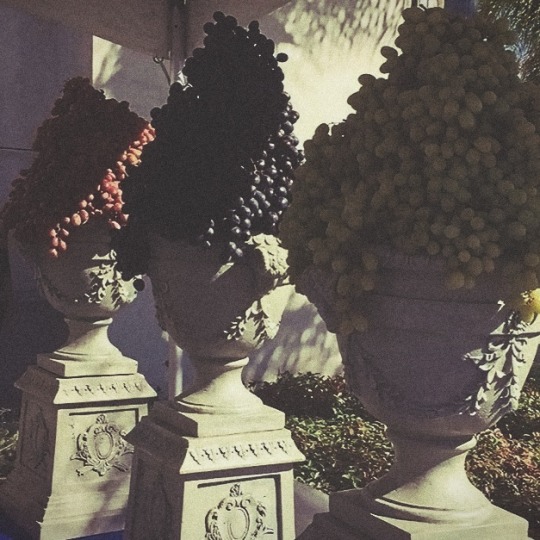
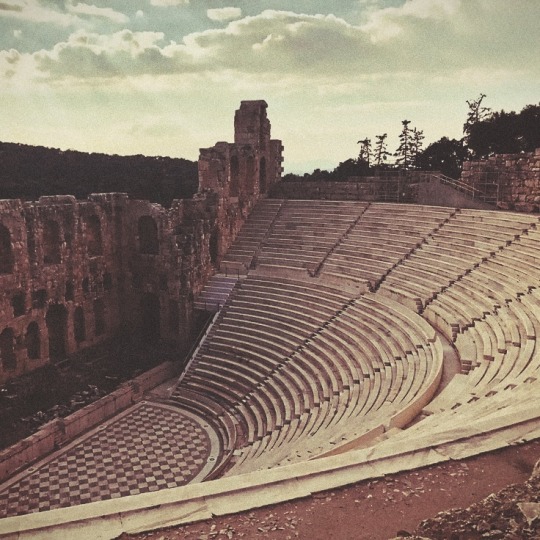
ORPHIC HYMN #52
TO LORD DIONYSUS
I call upon you, blessed, many-named,
frenzied Bacchos,
bull-horned, Nysian, Lysios,
Lenaios, conceived in fire.
Nourished in the thigh, Liknites,
you lead torch-lit processions,
you lead them in the night, O filleted,
O thyrsos-shaking Eubouleus.
Your nature three-fold, your rites ineffable,
O secret offspring of Zeus,
primeval, Erikepaios,
father and son of the gods,
you take raw flesh, and sceptered you lead us
into the madness of revel and dance,
into the frenzy of triennial feasts
that bestow calm on us.
You burst forth from the earth in a blaze . . .
O son of two mothers,
horned and clad in fawn skin, you roam the mountains,
O lord worshipped in annual feasts.
Paian of the golden spear,
nursling, decked with grapes,
Bassaros, exulting in ivy,
followed by many maidens . . .
joyous and all-abounding, come,
O blessed one, to the initiates.
(trans. by Apostolos Athanassakis)
#lord dionysus#dionysus#dionysos#bacchus#bacchic#dionysian#dionysus deity#dionysos deity#dionysus worship#hellenic polytheism#hellenism#hellenic#hellenic paganism#helpol#greek mythology#greek myths#orphic hymns#orphic hymn 52
152 notes
·
View notes
Text
Helios rests in the sky, fond eyes gazing upon the mortals below, baking the world to shades of perfect greens and soft browns.
Nyx races overhead, Her starlit body whisking past, with Eos joyfully clinging to Her skirt.
With every storm, Zeus sits in the sky, and hurls down lightning, following it with booming laughs which echo through the lands.
Hera watches weddings go on below, spreading Her blessings among the newlyweds, bringing them peace and prosperity.
Artemis rests in the hollows of mountains, where chilled breezes still blow from streams which have not forgotten the winter's snows. Her skin is dappled with sweat, and Her eyes are greener than the vibrant moss.
Apollon whispers in the ears of mortals, golden sunlight now carrying prophecies in the beams. He takes the hands of mortals and leads them to songwriting and poetry, to painting and music.
Hermes whisks Himself up and down the highways, taking care of the travelers who look for new horizons under the summer's heat.
Messages never seem to still as Iris, bounding up in the aftermath of rain, leaves vibrant rainbow trails behind Her.
Demeter and Persephone slip through Farmer's Markets, carrying more fruits and vegetables and grain than they can reasonably hold. With every fallen fruit, every tomato that squishes a bit, every fallen shaft of wheat, They laugh.
Out on the seashore, Poseidon watches the waves roll in, and the tides go out. The sandcastles left behind by small children are His favorite offerings.
In the mornings, among the waves of birdsong, gentle pipes sound throughout the forests, played by Pan.
And somewhere out in the wilds, both on stony mountain peaks and green riversides, tearing through golden grasses and dancing through firefly-lit forests, is Dionysos. Head thrown back, long hair flowing, teeth bared in joy.
#kind of a followup to that other post i did for spring#dionysian#dionysos#dionysus#hellenic polytheism#hellenic polytheist#dionysos deity#dionysus deity#hellenic pagan#hellenic gods#hellenism
496 notes
·
View notes
Text
Little sketch of Dionysus

I love him
#art#artwork#illustration#my art#drawing#drawings#my draws#traditional drawing#art on tumblr#artists on tumblr#dionysos deity#dionysus#dionysus deity#dionysos#dionysian#hellenistic paganism#pagan#paganism#hellenic pagan#hellensim#hellenic polytheism#hellenism#hellenic deities#hellenic worship
79 notes
·
View notes